|
|
|
Sort Order |
|
|
|
Items / Page
|
|
|
|
|
|
|
| Srl | Item |
| 1 |
ID:
101040
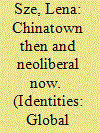

|
|
|
|
|
| Publication |
2010.
|
| Summary/Abstract |
This article explores the intersection of cultural tourism, gentrification, and urban development in the neoliberal period by examining the complex and ambivalent relationship between an "ethnic-specific" cultural institution and a rapidly gentrifying neighborhood. Through a case study of the Museum of Chinese in America's (MoCA) profile, history, and community involvement in Manhattan's Chinatown, this article suggests that small to midsize ethnic-specific museums relate to the social and spatial transformations inherent in gentrification through a mechanism called gentrification consciousness. This mechanism helps to explain how an institution whose history, mission, and politics might indicate a resistance to gentrification is confounded and constrained by the larger neoliberal landscape. Offering little in the way of substantive alternative funding and space, neoliberal urban development touts tourism and culture as key routes to economic development with gentrification as a "natural" and beneficial by-product of such development for both the surrounding neighborhood and for individual cultural institutions. An analysis of the unique relationship of smaller ethnic-specific organizations to gentrification processes complicates discussions about museums and gentrification as well as potentially identifying methods and measures of institutional success that do not rely so heavily on neoliberal logics and policy prescriptions.
|
|
|
|
|
|
|
|
|
|
|
|
|
|
|
|
| 2 |
ID:
178893
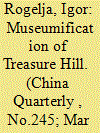

|
|
|
|
|
| Summary/Abstract |
This article discusses the “museumification” of an urban village in Taipei into the Treasure Hill Artist Village in the context of wider debates on gentrification and the redevelopment of marginal urban spaces. Populated by soldiers evacuated to Taiwan following the Chinese Civil War, Treasure Hill became a hybrid space, combining welfare provision for elderly veterans with an artist colony, forming part of the Taipei Cultural Foundation. Lauded as a compromise that combined social, cultural and economic aspects of urban regeneration, the mix of high-modernist paternalism and neoliberal place-making resulted in the integration of the space into the existing city bureaucracy as a museum-like institution, with elderly residents and artists becoming exhibits in a living diorama. Although widely understood as “gentrification” at the time, the article argues that the museumification of Treasure Hill was a process led by a coalition of state and spatial experts which has distinct implications for the study of state-led neighbourhood amelioration.
|
|
|
|
|
|
|
|
|
|
|
|
|
|
|
|
| 3 |
ID:
155535
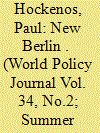

|
|
|
|
|
| Summary/Abstract |
Berlin’s gritty, inventive, do-it-yourself underside attracted droves of young, educated people. But now the tides of gentrification threaten the city’s quirky demeanor. World Policy Institute fellow Paul Hockenos explains how Berlin’s artists and residents are fighting back.
|
|
|
|
|
|
|
|
|
|
|
|
|
|
|
|
| 4 |
ID:
178458
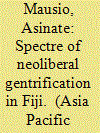

|
|
|
|
|
| Summary/Abstract |
This article seeks to examine Fiji's current housing crisis against the backdrop of neoliberal urbanism. In doing so, the article offers a fresh new perspective on the marginalisation, displacement and outright exclusion of the urban poor from the inner city areas of Suva. Among the trademark growth problems experienced by neoliberal cities across the globe, the crisis of urban housing affordability is perhaps more pronounced in Suva given economies of scale and constraints in Fiji's land tenure system. This article seeks to highlight that Suva's inner city spaces are being transformed along the lines of market fundamentalism and that this will exacerbate the social exclusion and displacement of Suva's poor.
|
|
|
|
|
|
|
|
|
|
|
|
|
|
|
|
| 5 |
ID:
077451
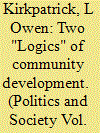

|
|
|
|
|
| Publication |
2007.
|
| Summary/Abstract |
Two Community Development Corporations (CDCs) in Oakland, California, anchor the following analysis. These legally homogenous organizations have implemented similar "low-income" redevelopment projects widely hailed as representing a single successful blueprint for urban revitalization. Despite their similarities, however, these entities have produced starkly different socio-economic outcomes-a phenomenon traced to the CDCs' divergent internal structures and the contrasting external contexts of their development activities. These variations generated competing "logics" of redevelopment. On one hand, we find a CDC dominated by market-oriented interests and the economic logic of exchange-values, while on the other, we find a CDC dominated by community-oriented interests and the social logic of neighborhood use-values
|
|
|
|
|
|
|
|
|
|
|
|
|
|
|
|
| 6 |
ID:
178991
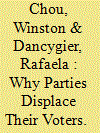

|
|
|
|
|
| Summary/Abstract |
Across advanced economies, affordable housing shortages are pushing low-income voters out of cities. Left governments frequently exacerbate these shortages by eliminating public housing. Why does the Left pursue policies that displace its voters? We argue that the Left’s long-term rebalancing towards the middle class and away from an increasingly stigmatized “underclass” has significantly attenuated the trade-offs inherent in reducing affordable housing. Focusing on the UK, we demonstrate that by alienating low-income voters politically and reshuffling them across districts, housing crises have significant costs for Labour. Yet, drawing on interviews, we show that displacement is nonetheless compatible with electoral interests: the displaced make room for richer voters whom politicians believe will also support Labour. A quantitative analysis of Greater London’s 32 local authorities and 624 wards further documents trends in line with coalitional rebalancing. Taken together, our findings demonstrate that electoral foundations are key to understanding housing crises and gentrification.
|
|
|
|
|
|
|
|
|
|
|
|
|
|
|
|
|
|
|
|
|